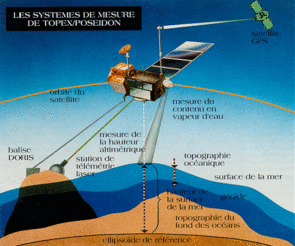Aviso, the First movement
Michel Lefebvre (Cnes Topex/Poseidon Project Scientist)
Aviso Altimetry is born.
This is not just a happy event and a christening, but a whole new concept.
Aviso is the culmination of joint reflection by the people who matter: users who actually work on the data, project leaders and data processing specialists.
We are trying to meet two very different requirements.
First, continuity: scientists will need long, homogeneous time series to analyze, at least twenty years for climate research. Satellite observations generate huge volumes of data. A research laboratory or even an institute can hardly be asked to handle this task alone, without taking up all available staff time. It is rather like a Mexican who first gets a few notes out of a guitar, then more and more, and is finally overwhelmed by what he has done.
Secondly, quality and flexibility. Conventionally, databanks have supplied impressive number-crunching power and data management skills, and asked present and future users to provide their specifications. Even when their requirements are closely matched, such a static approach is not enough.
Aviso knows that these two apparently incompatible sets of constraints not only must but can be met.
We might compare our work to the development of a symphony. It could have been the New World; we have chosen Mozart's Symphony no. 40.


The oceans have a music of their own. How can you hear it? By what scientists-rather than musicians-call successive iteration. The researcher is like a composer, grasping a theme. They rush to some music paper and jot a few notes along the stave. The theme takes shape. The first orchestration fills it out. A group of friends play the theme to see how it sounds, say if the feeling is right. Now the theme needs to be formalized, given a key. Publishers will bring out scores, cassettes and disks, so that others around the world can play the music, now and in fifty or a hundred years' time. The score will need to be clear and detailed, because tastes in music will change; other orchestras around the world, other soloists who may not yet be born will play it, adding their cadences, using new instruments.
That is what Aviso is-not just a technical solution, important though that is, but rigor and innovation blended into constant added value.
The division of labor will need to be more flexible than ever. This is the really tricky part, needing continual feedback. The hardware, the data and the partners will change, but our methods are open-ended enough to move with the times.
Our example can be the ocean itself-an ever-changing surface, mezza voce or fortissimo, largo or furioso. It takes a sturdy craft, Aviso, to sail the waters, and experience, good luck and an adaptable crew.
We will need all our intuition when selecting results and auxiliary data likely to be useful for future models and algorithms.
For Aviso to make its debut with Topex/Poseidon is a stroke of luck for everyone. Those of us working on Aviso have a real-life case and a stable environment. For Topex/Poseidon, Aviso is a guarantee of continuity. More projects will follow. We shall tune our instruments together. Others will add their timbre and pitch.
The first CD will be out soon. There may be errors, the occasional wrong note-if anyone can make out a wrong note in a new key or the brass section. But the CD drive will not iron them all out; that is a job for listeners and players and instrument makers.
As you venture forth, Aviso will go with you.






